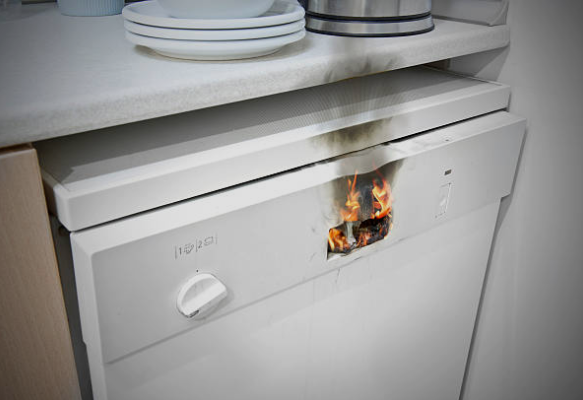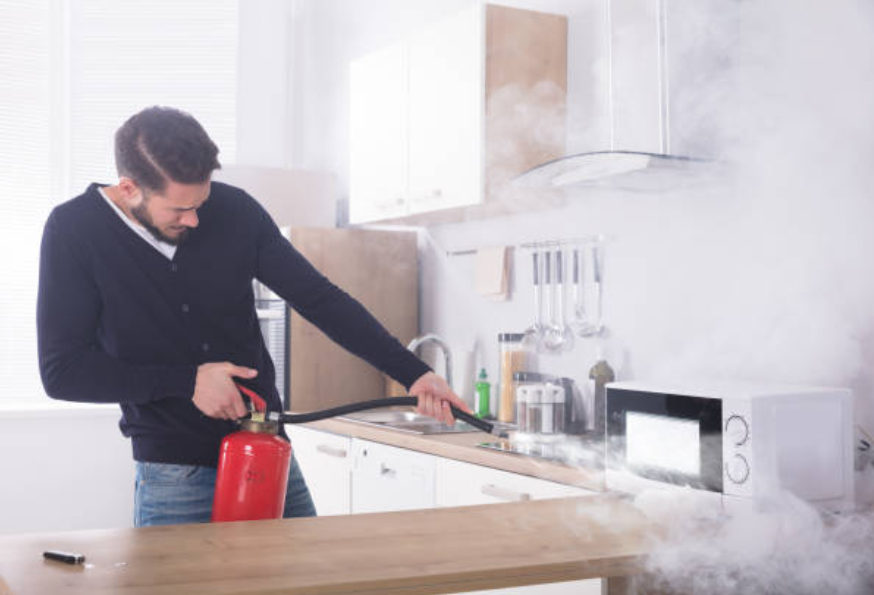
At a Glance
How to Extinguish an Electrical Fire
Electrical fires are something that you never expect coming, which means it is important to be prepared if an electrical fire breaks out in your home. An electrical fire can be scary and extremely dangerous, but there are ways to be prepared in case of an emergency. If one of your appliances goes up in flames, it’s important not to panic. Let's explore the ins and outs of electrical fires so that you know what to expect and how to prevent them from happening. Follow these simple guidelines to keep your home safe from electrical fires.
Explore New Appliances
Dealing with the aftermath of an appliance fire? Discover new appliances from top brands like KitchenAid, Bosch, LG and more at Plaza Appliance Mart!
View AppliancesPreventing Electrical Fires

You can stop electrical fires before they start by following a few basic rules of appliance safety. Be sure not to plug in too many devices into one outlet—the wiring can get overloaded and spark a fire, especially if there’s clutter like paper or clothes nearby the outlet. It can be easy to forget about the dangers of larger appliances since they stay plugged in all the time, but they can present as much of a fire hazard as small devices like toasters and heaters. Large appliances like washing machines and dishwashers shouldn’t be left running overnight or while you’re away from home, and avoid placing refrigerators or freezers in direct sunlight, to prevent overworking their cooling systems. Check all outlets regularly for excessive heat, burn marks, and buzzing or crackling sounds that might point to electrical arcing. Make sure you have at least one smoke detector on every floor of your home, and test them regularly to keep them in good working order.
What Causes Electrical Fires
Electrical fires can be devastating and pose a significant risk to your life and property. Understanding the common causes of electrical fires is crucial in preventing such incidents. Here are four of the most frequent causes of electrical fires so you know what to look out for:
-
Faulty Wiring: Faulty wiring is a leading cause of electrical fires. It can occur due to poor installation, aging, or deterioration of electrical systems over time. Frayed or damaged wires, loose connections, or improper installation can all generate electrical sparks, leading to subsequent fires.
-
Overheating: Appliances that generate heat, such as ovens, toasters, and microwaves, can pose a fire hazard if they overheat. Overheating can occur due to prolonged use, malfunctioning thermostats, blocked ventilation, or insufficient airflow. When an appliance becomes excessively hot, it can ignite nearby materials and trigger a fire.
-
Misuse or Improper Maintenance: Misusing or neglecting the maintenance of appliances can contribute to electrical fires. This includes using an appliance in a manner not intended by the manufacturer, such as using an indoor appliance outdoors. Similarly, failure to clean appliances, especially those prone to accumulating lint or grease, can lead to the buildup of flammable materials, increasing risks of fires.
-
Outdated Electrical Systems: Outdated electrical systems pose a significant fire hazard. Older homes or buildings may have outdated wiring that is not designed to handle the electrical demands of modern appliances and devices. Over time, these outdated systems become more susceptible to electrical faults and can increase the risk of electrical fires.
→ Learn more: How to Clean a Greasy Range Hood in Three Easy Steps
What Not to Do
During an electrical fire, it's crucial to know what actions to avoid in order to prioritize your safety and prevent the situation from worsening. Here are some important things not to do during an electrical fire:
✗ Do not use water: If a fire breaks out, it can be tempting to douse the flames with water, but water should never be used to put out an electrical fire. Water conducts electricity, and dumping water on or near a power source can give you a severe electrical shock. It might even make the fire worse. Water can conduct the electricity to other parts of the room, running the risk of igniting other flammable objects nearby.
✗ Do not touch or attempt to unplug the appliance: Avoid touching any electrical appliances or attempting to unplug them during an electrical fire. The cords and outlets may be energized and pose a significant risk of electrical shock.
✗ Do not dismiss the fire: Even if the fire seems small or contained, never dismiss an electrical fire thinking it will go out on its own. It can rapidly spread and cause extensive damage. Always treat an electrical fire as a serious emergency and take immediate action to address it.
✗ Do not fan the flames: Avoid using any object to fan or blow air onto the fire. This can cause the fire to grow in size or spread to nearby objects, increasing the danger to yourself and others.
✗ Do not hesitate to call emergency services: Never delay in calling emergency services when faced with an electrical fire. Contact your local fire department as soon as possible to report the fire and provide them with accurate information about the situation.
✗ Do not re-enter the building without professional guidance: Once you have safely evacuated the premises, do not attempt to re-enter the building without the guidance of professional firefighters or electricians. They will be able to assess the situation and determine when it is safe to return.
Remember, the priority during an electrical fire is your safety and the safety of others. By avoiding these actions and following the appropriate emergency protocols, you can help minimize the risks associated with an electrical fire and allow the professionals to handle the situation effectively.
How to Extinguish an Electrical Fire

The first thing you want to do is unplug the device from the power source and call the fire department. Even if you think you can take care of the fire yourself, it’s important to have backup if the flames do get out of control.
For small fires, you may be able to use baking soda to smother the flames. Covering the smoldering or burning area with a layer of baking soda can block oxygen flow to the flames with minimal risk of electrocution. Baking soda also contains sodium bicarbonate, which is the same substance used in standard fire extinguishers. You might be able to smother a small fire using a heavy blanket as well, but only if the flames are small enough not to catch the blanket on fire too.
For larger fires, use a Type C fire extinguisher. You should always make sure you have at least one Type C or multi-use extinguisher in your home. Extinguishers should also be checked regularly to make sure they haven’t expired. If you have a working extinguisher on hand, just pull the pin at the top, aim the nozzle at the source of the fire, and squeeze the handle. If the flames get too big to fight alone or you think the fire might block an exit, leave the building immediately, close the door behind you, and wait for help from the fire department.
→ Learn more: Is It Cheaper to Repair or Replace Your Appliances?
FAQ
What are the signs of an electrical fire?
Signs of an electrical fire may include frequent circuit breaker tripping, flickering or dimming lights, discolored outlets or switch plates, burning smells or sparks from outlets/appliances, hot or vibrating electrical outlets, and appliances feeling excessively hot during use.
What should you do for an electrical fire?
In case of an electrical fire, immediately cut off the electrical supply by turning off the corresponding circuit breaker, if the fire is too large to smother, call emergency services to report the fire and evacuate the premises. If safe and small, use a Class C fire extinguisher designed for electrical fires to put out the flames.
How do electrical fires usually start?
Electrical fires can start due to various reasons, including faulty wiring, overloaded circuits, damaged electrical cords or appliances, outdated electrical systems, and improper use of electrical equipment.
Can an electrical fire start if the breaker is off?
Typically, an electrical fire cannot start if the breaker is off. The purpose of a breaker is to interrupt the electrical current and prevent overloads or short circuits that can lead to fires. However, it's always essential to exercise caution and have a professional inspect the electrical system to ensure there are no underlying issues contributing to the fire risk.
Why Trust Plaza Appliance Mart?
Plaza Appliance Mart is a local, family-owned, appliance store in North Carolina where you can get personalized, expert service that you won’t find at the big box stores. Plaza Appliance Mart is YOUR source for competitive prices with knowledgeable in-store professionals here to help you every step of the way, whether you need to replace an old appliance, or if you're remodeling and need an entire kitchen full of new brand-name products. And, our delivery and installation specialists will assure that your new appliances arrive safely and are installed properly.
If you were to ask the employees at Plaza Appliance Mart about their roles in the company, they'd say they're not just employees, they're family. So as you might imagine. a team of professionals like this who are already so tightly knit and bonded together makes for a perfect partner with the Ronald McDonald House of Charlotte. Apart from its community ties, Plaza Appliance is an accredited Better Business Bureau company with an A+ Rating.
Shop Appliances at Plaza Appliance Mart
Stop by Plaza’s Charlotte, Huntersville, Matthews, or Pineville locations to see what a difference buying locally with an experienced staff can make. Or shop for appliances online! Our friendly experts are always happy to help you find appliances that are safe and effective in your home — whether you call us at 704-568-7600, use our online chat feature, or visit us in person.
→ Learn more: How to Clean Your Major Appliances